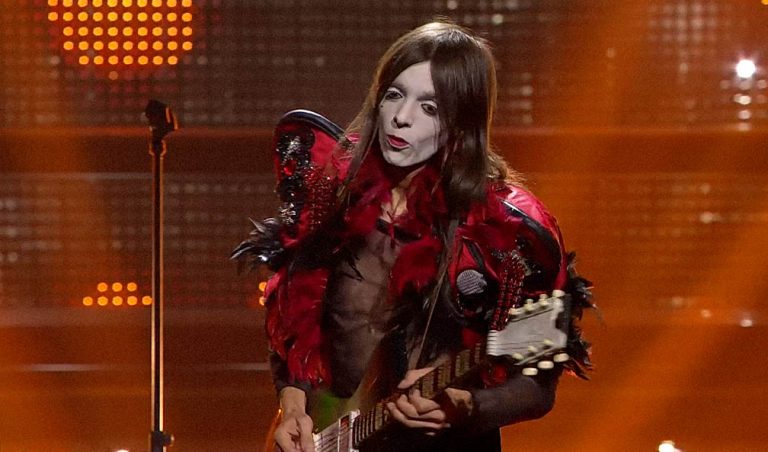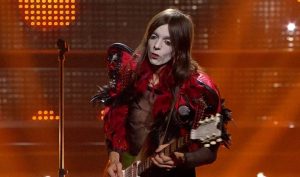
Italy at Eurovision 2025: The Italian representative will play live on stage despite the ban. How did he find a way to bypass the rules?
The performance of Italy’s representative, Lucio Corsi with the song “Volevo essere un duro” (translated: “I Wanted to Be Tough”) at Eurovision 2025 is set to be nothing short of revolutionary – and not just musically. During his performance at this year’s competition in Basel, Switzerland, Corsi announced that he would play live on the harmonica – an action that, according to the official Eurovision rules, constitutes a violation of the guidelines. However, the singer found a creative way to bypass the ban – and change the game.
The Surprise Revelation
The revelation about the surprise was first shared on an Italian talk show. During a conversation with the host, Lucio Corsi pulled a harmonica from his pocket and played a few melodies for the audience. These were excerpts he often includes in his live performances, primarily to fill quiet moments or transitional segments between songs.
However, this time, the revelation wasn’t just a musical demonstration. The singer took the opportunity to announce a detail that had been kept well under wraps until then: “At Eurovision, I will play this harmonica live during my song.”
A Song Without a Harmonica – With a Harmonica
What makes this decision particularly intriguing is the fact that the studio version of the song does not include any harmonica playing at all. Therefore, this addition represents a substantial change in the performance’s character – a change not just in the stage arrangement but also a statement of intent from an artist wishing to highlight his personal identity, style, and artistic freedom even within the rigid Eurovision framework.
Eurovision Rules – And What Corsi Does With Them
According to the official rulebook sent to all participating delegations in advance of Eurovision, artists are prohibited from playing live on musical instruments during the performance. The reason for this restriction is entirely logistical – there isn’t enough time or technical capability to connect and synchronize musical instruments before live performances when dealing with a meticulously timed live television broadcast. This rule is not new and has been a part of Eurovision for many years.
But Lucio Corsi found a loophole in the rule: unlike guitars, drums, or pianos, a harmonica does not require any electrical connections or cables. It is an instrument that can be played on the spot – without any technical synchronization. Additionally, the sound of the harmonica can naturally blend with the microphone Corsi uses for singing, so there’s no real problem playing it live.
Corsi explained this himself during the interview: “The sound of the harmonica will be captured through my regular microphone. There’s no need to connect anything. It just works.”
Behind the Scenes – An Artistic Decision or Provocation?
Lucio Corsi’s move has sparked interest not only among music fans but also among journalists and Eurovision experts. The fact that he is changing the arrangement of his song and introducing a live, rare, and exceptional element into a competition where almost everything is pre-recorded could be seen by some viewers as a rebellious statement, perhaps even political. Others see it as an artistic upgrade that highlights the uniqueness of the artist.
Over the years, there have been instances where participants tried to “break the rules” at Eurovision, but few succeeded within the existing guidelines. Corsi’s move could set a precedent and lead to future changes in Eurovision’s approach to improvisation, live music, or the use of unconventional methods.
The Voting at Eurovision – And How Such Influence Could Change the Balance
Lucio Corsi’s song has generated much curiosity since securing his place as Italy’s representative for Eurovision 2025, despite not winning the Sanremo Festival, where he came in second. His unique musical performance, the semi-surrealistic lyrics, and his striking stage presence all together create a mix unlike anything else in the competition. The harmonica – if integrated wisely – could prove to be a winning card.
In recent years, European audiences have tended to favor performances that feel “real,” not too sterile. Adding live music could bring Corsi closer to the hearts of voters – especially in countries where the local music culture places an emphasis on authenticity and live performances.
Italy at Eurovision 2025
“Volevo essere un duro” (translated as: “I Wanted to Be Tough”) is the song performed by singer Lucio Corsi, which came second at the 75th edition of the Sanremo Festival. The song was written by the singer himself along with Tommaso Ottomano. This was the singer’s first-ever appearance at the festival. The song is performed in Italian.
Who is Lucio Corsi?
 Lucio Corsi, born on October 15, 1993, in Grosseto, Italy, is an Italian singer-songwriter and musician. He grew up in the village of Vetulonia near where his family runs a restaurant. His mother is a painter, while his father has worked in various roles including as an employee of the Italian national broadcaster Rai and as an artist working with leather. Corsi’s love for music was sparked by watching the movie “The Blues Brothers” as a child, and he began writing songs at a very young age, performing in bars and squares of his hometown from 2011.
Lucio Corsi, born on October 15, 1993, in Grosseto, Italy, is an Italian singer-songwriter and musician. He grew up in the village of Vetulonia near where his family runs a restaurant. His mother is a painter, while his father has worked in various roles including as an employee of the Italian national broadcaster Rai and as an artist working with leather. Corsi’s love for music was sparked by watching the movie “The Blues Brothers” as a child, and he began writing songs at a very young age, performing in bars and squares of his hometown from 2011.
He began composing instrumental pieces of progressive rock before turning to lyrical writing. After finishing his high school studies in Grosseto, he moved to Milan with the aim of developing his musical career, initially living near Naviglio Pavese, then in Via Ripamonti, and eventually in Niguarda. This participation was the singer’s first ever in the Italian Sanremo Festival.
Source: blogtvitaliana
Eurovision 2025: This will be Italy’s 50th participation in Eurovision. Italy joined the contest in 1956, was one of the seven founding countries, and has won three times over the years. Italy’s most recent victory was at Eurovision 2021 with the song “Zitti e buoni” performed by the band Måneskin.

